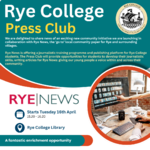Teaching and Learning Policy Statement
Context
At Rye College, all our teachers are committed to ensure every student succeeds and thrives. To secure bright futures for all of our students, teachers must use the best pedagogical approaches to engage, challenge, and stretch. They must plan learning to build on what is already known and to instil a passion for their subject and learning in general.
Barak Rosenshine’s ‘Principles of Instruction’ underpin our approach to teaching and learning, along with the expectation that teachers evaluate the impact of their teaching and constantly strive to secure rapid progress.
Aims
Rye College aims to ensure that every student fulfils their potential and develop independent learning through the highest quality teaching. Teaching and learning at Rye College seeks to ensure that all students achieve their FFT20 indicator no matter what their starting is.
Action plan
Teachers must refer to the Teachers’ Standards: these define the minimum level of practice expected. In summary, teachers must:
- Set high expectations which inspire, motivate and challenge students;
- Promote good progress and outcomes by students;
- Demonstrate good subject and curriculum knowledge;
- Plan and teach well-structured lessons;
- Adapt teaching to respond to the strengths and needs of all students;
- Make accurate and productive use of assessment;
- Manage behaviour effectively to ensure a good and safe learning environment;
- Fulfil wider professional responsibilities.
At Rye College, we can achieve excellence through SMART teaching and learning:
- Structured teaching and learning
- Modelling excellence
- Assessing and providing feedback
- Routines that reinforce learning
- Tilting our teaching to secure rapid progress
Structured teaching and learning
Planning at a long term level provides clear structures for knowledge and skills development and ensure that students progress rapidly. Curriculum plans outline the knowledge goals, tasks and assessment opportunities at each stage of our developing knowledge curriculum, which places great emphasis on ‘sequential learning’ as a means of promoting maximum knowledge acquisition and retention. These curriculum plans are developed by the Subject Leaders in line with the National Curriculum, statutory requirements and subject specific assessment criteria. Each subject area uses a shared approach to planning and every teacher must follow the scheme of work laid down in the faculty plans, while adapting the delivery and content of each lesson to support the needs of their teaching groups and scaffold learning. Strategically placing the retrieval of pre-taught knowledge at the beginning of lessons allows for new knowledge, taught throughout the rest of the lesson, to be more easily accessible. New learning is then presented in small steps.
Modelling excellence
Students are novices and require clear examples of what we want them to achieve. We provide them with instruction and demonstrate what excellence looks like. Teachers are the experts, both in terms of the specific subject knowledge and the skill of applying knowledge. As the expert in the room, we use modelling to guide students through each stage and explain the rationale of each stage, prior to the student’s independent attempt.
Teachers at Rye College, plan lessons to incorporate both live and pre-prepared modelling. Teachers will model ‘how to’ using small steps. This approach reflects our understanding that students, as novices, require information and instruction to be ‘chunked’ down to avoid cognitive overload. In addition, teachers model their thinking about how they are solving a problem or completing a task. This provides students with a model that they can replicate.
Assessing and providing feedback
Teachers at Rye College regularly assess their students’ work: to generate summative and formative information on the impact of the curriculum, teaching and learning and student progress. This information informs a range of stakeholders and future planning.
Most importantly, however, it will inform the feedback given to the student to identify the next steps they need to take to improve/progress. Feedback at Rye College will comment on the effort shown by the student, the attainment, target for improvement and the required student response to secure progression. Feedback can be given in a variety of forms: verbal and/or written; whole class and/or individual; via peer or self-assessment. But its purpose is to secure progression. Opportunities for students to respond to the feedback are provided in order for them to set targets, and/or develop the work assessed.
Routines that reinforce learning
At Rye College, we plan, teach and reinforce routines. Routines provide structure to support our students’ learning. Routines creates an environment that is learning focused, where learning is reinforced and embedded, and where students can feel confident when challenged to exceed their expectations. Teachers focus on planning lessons where every minute counts and where students feel safe and confident to become increasingly independent practitioners.
Tilting our teaching to secure rapid progress
Best progress is the result of effective teaching and learning. To ensure that every student, no matter what their starting point is or what barriers affect their learning, fulfils their potential, teachers at Rye College tilt the focus of their effective practice where it is most needed. In particular, students who are disadvantaged, are advantaged through: identification, direct questioning, no opt-out, settle and check, and priority marking.
Continuous Professional Learning and Development
Rye College is committed to fulfilling every students’ potential through providing the highest quality of teaching and learning. Our CPLD programme is designed to embed high quality teaching and learning through development of the ten principles of instruction, and self-reflective professionalism. Rye College teachers’ professional development is personalised, subject specific and continuous.
Policy Monitoring
The impact of the teaching and learning policy is monitored principally via student outcomes whether in public examinations or through the internal tracking system.
In addition, monitoring of the quality of the teaching and learning at Rye College is carried out through the Appraisal system. This includes lesson observations, book looks and work scrutiny, student voice, self-appraisal, outcome and tracking analysis, faculty area deep dives and external advisors.
In the first instance, it is the class teacher’s responsibility to monitor and evaluate the quality in their lessons. The faculty lead will monitor the impact of teaching learning across their specific faculty team. The Assistant Headteacher – teaching and learning, will co-ordinate and support quality assurance across the whole college.
.jpg)
_(1)_(1).jpg)



